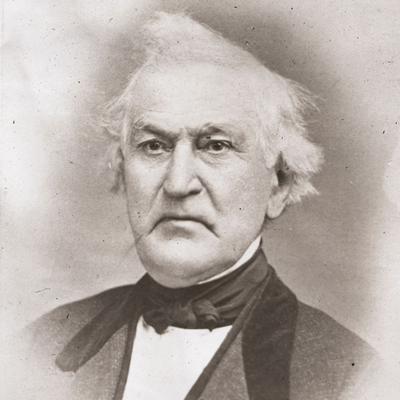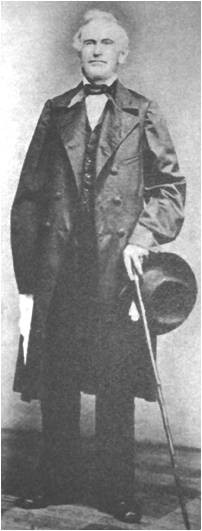David Whitmer
(1805-1888)




By Susan Easton Black
David grew to maturity on wooded farmland in Fayette, New York. In 1828 rumors of a “gold Bible” were confirmed to him in letters by Oliver Cowdery. David conveyed the Prophet Joseph Smith and Oliver Cowdery from Harmony, Pennsylvania to the Whitmer home in Fayette where the translation of the Book of Mormon was completed. He was one of Three Witnesses of the Book of Mormon and testified that he saw the gold plates and beheld “a dazzlingly brilliant light that surpassed in brightness even the sun at noonday and a personage clothed in white and near him a table containing the ancient artifacts.”1
On April 6, 1830 David was at the organizational meeting of the Church, being one of the six original members. He gathered with the Saints in Kirtland, Ohio. By 1831 he had joined the Saints in Jackson County, Missouri, in hopes of building a New Zion. When persecution raged against the Saints in Jackson, David was driven from his home across the Missouri River to Clay County.
On July 3, 1834 he was appointed president of the Clay County high council, and four days later President of the Church in Missouri. His leadership was laudatory and his diligence in giving much needed service was recognized. But after attending the Kirtland Temple dedication in March 1836, David faltered in his faith and expressed apostate sentiments against the leadership of Joseph Smith. By 1837 he had joined those in Kirtland claiming the Prophet Joseph sought for earthly power and station and had “abandoned the primitive faith” and “drifted into error and spiritual blindness.”2 His apostate views and actions led to David losing his membership on April 13, 1838 in Far West, Missouri. Believing himself maligned by the excommunication, he turned to family for support. The Whitmers left the Church.
David remained estranged from Church fellowship the remainder of his life. He avoided affiliating with any religious sect until 1846-1847 when William McLellin convinced him to join his reorganized church. His flirtation with religiosity was quickly abandoned.
David found pleasure in community and business opportunities in Richmond, Missouri. He was elected to the Richmond city council for multiple terms and filled the unexpired term of mayor from 1867 to 1868. He was the owner and proprietor of the “Livery and Feed Stable of D. Whitmer & Son” of Richmond.
In the 1870s David organized the Church of Christ. His congregation was small, a few friends and family members. The Richmond Conservator of January 9, 1885 reported, “If a life of probity, of unobtrusive benevolence and well doing for well-nigh a half century, marks a man as a good citizen, then David Whitmer should enjoy the confidence and esteem of his fellow men.” In 1887 he wrote the pamphlet “An Address to all Believers in Christ,” revealing his religious views at age 82 and his rejection of Brigham Young’s “Mormonism.”
Through his years of religious wavering, it should be noted that his testimony of the Book of Mormon never wavered. On his death bed David was still professing the truth of the Book of Mormon. He said to his attending physician Dr. Buchanan, “I want you to say whether or not I am in my right mind, before I give my dying testimony.” The doctor answered, “Yes, you are in your right mind.” David then professed to his family who had gathered at his bedside, “I want to say to you all, the Bible and the record of the Nephites (Book of Mormon) is true, so you can say that you have heard me bear my testimony on my death-bed.”3
1. Lyndon W. Cook, ed., David Whitmer Interviews, A Restoration Witness (Orem, UT: Grandin Book, 1991), xiv.
2. David Whitmer, An Address to All Believers in Christ (Richmond, Mo. n. p. 1887).
3. Andrew Jenson, Latter Day Saint Biographical Encyclopedia 4 vols. (Salt Lake City: Andrew Jenson History Company, 1901), 1:270.
Additional Resources
- Biography of David Whitmer (josephsmithpapers.org)
- KnoWhy #54 – Who Are the “Few” Who Were Permitted to See the Plates?
- KnoWhy #267 – Why Were Three Witnesses Chosen to Testify of the Book of Mormon?
- KnoWhy #395 – Why Is David Whitmer’s Witness of the Book of Mormon So Compelling?
- KnoWhy #403 – Are the Accounts of the Golden Plates Believable?
- KnoWhy #405 – Why Were the Three Witnesses Shown the Liahona?
- KnoWhy #488 – The Simple Miracle That Helped the Whitmers Further the Book of Mormon
- KnoWhy #521 – Did the Book of Mormon Witnesses Really See What They Claimed?
- KnoWhy #608 – Why Was David Whitmer Excommunicated from the Church?
- KnoWhy #609 – Why Did David Whitmer Never Return to the Church?
